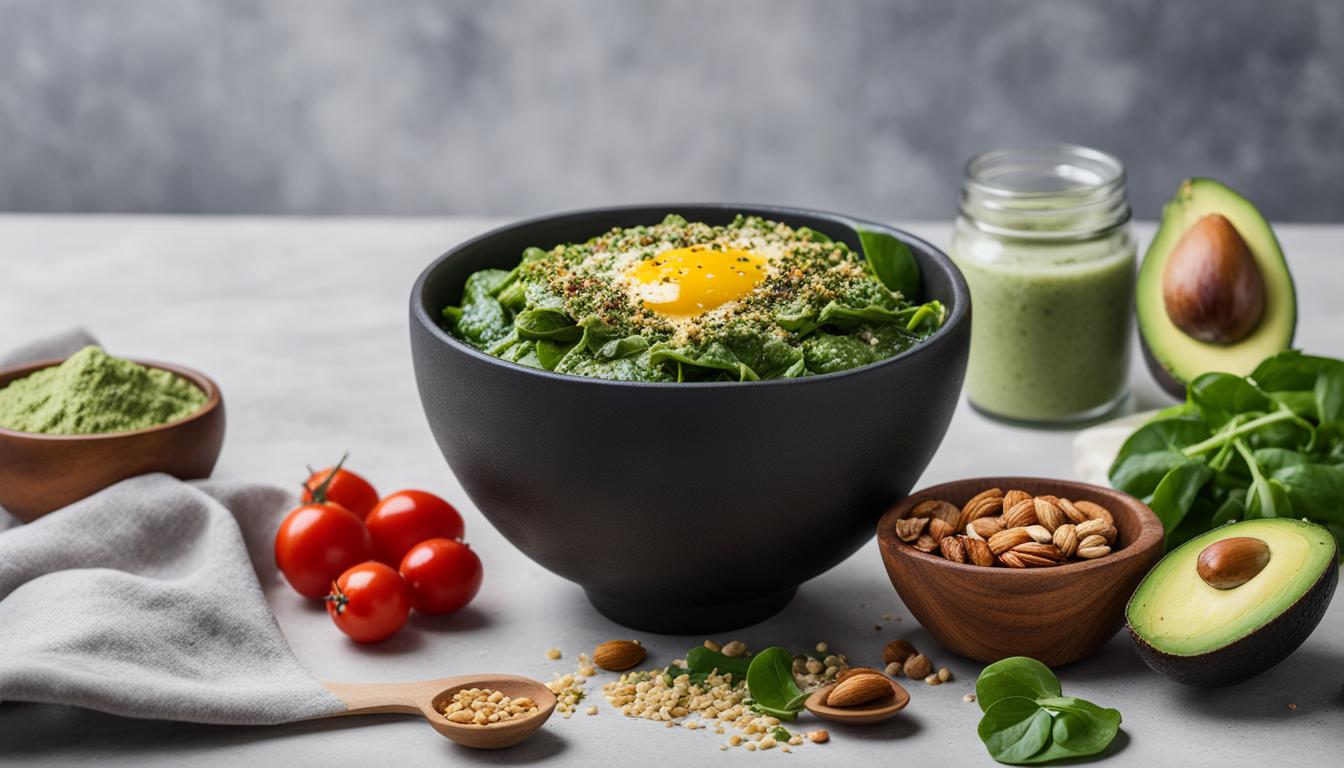Unlock the Secret to Keto Success with Flax Seeds: Nutritional Benefits, Delicious Recipes, and More!
Unlock the Secret to Keto Success with Flax Seeds: Nutritional Benefits, Delicious Recipes, and More!
Introduction to Flax and its Benefits for a Keto Diet
Hey there, keto enthusiasts! Today, we’re diving into the wonderful world of flax seeds and their incredible benefits for those following a ketogenic lifestyle. Whether you’re a seasoned keto pro or just starting your journey, incorporating flax seeds into your daily routine can be a game-changer.
Let’s start with the basics. Flax seeds, also known as linseeds, are tiny powerhouses of nutrition. Packed with fiber, protein, and healthy fats, these little seeds are a fantastic addition to any diet, especially for those following a keto regimen.
Understanding the Keto Diet
Before we delve into the specifics of how flax seeds can complement a keto lifestyle, let’s talk about the keto diet itself. The ketogenic diet, or keto diet, is a low-carb, high-fat eating plan that has gained immense popularity for its potential health benefits.
When you follow a keto diet, your primary goal is to reach a state of ketosis, where your body switches from using glucose as its main source of energy to using ketones, which are produced from fats. To achieve ketosis, you significantly reduce your carbohydrate intake and increase your consumption of healthy fats, along with a moderate amount of protein.
Nutritional Value of Flax Seeds
Now, let’s talk about the superstar of our discussion – flax seeds. These tiny seeds are a nutritional powerhouse, offering a wide array of health benefits. Just one ounce of flax seeds provides around 6 grams of protein, 8 grams of fiber, and 12 grams of fat, of which the majority is the heart-healthy omega-3 fatty acid, alpha-linolenic acid (ALA).
Additionally, flax seeds are rich in lignans, which are plant compounds known for their antioxidant and estrogenic properties. Studies have suggested that lignans may have protective effects against certain types of cancer, cardiovascular disease, and osteoporosis, making flax seeds even more valuable for overall health and well-being. Plus, their high fiber content can help support digestive health and promote feelings of fullness, which can be incredibly beneficial when following a keto eating plan.
Flax Seeds and the Keto Lifestyle
So, how do flax seeds fit into the keto equation? Well, the nutritional profile of flax seeds aligns perfectly with the macro requirements of a ketogenic diet. With their low net carb content and high fat and fiber content, flax seeds are an excellent addition to keto-friendly recipes, providing a satisfying crunch and nutty flavor.
One of the key challenges of a keto diet is ensuring an adequate intake of fiber, as many high-fiber foods are also high in carbs. However, flax seeds come to the rescue with their impressive fiber content, making them an ideal choice for maintaining digestive health and supporting your keto journey.
Moreover, the healthy fats in flax seeds contribute to the overall fat intake required for ketosis, while the protein content helps in meeting your daily protein needs. From sprinkling ground flax seeds over your morning yogurt or smoothie to using them as a binding agent in keto-friendly baking, the options for incorporating flax seeds into your meals are endless!
So, whether you’re whipping up a batch of flaxseed crackers, adding a crunchy flaxseed crust to your favorite protein, or simply enjoying a sprinkle of ground flax seeds on your salad, the versatility of flax seeds makes them a valuable ally in your keto journey.
Now that we’ve uncovered the nutritional benefits of flax seeds and their perfect fit within a keto lifestyle, it’s time to put this knowledge into action. Stay tuned for our upcoming articles, where we’ll share mouthwatering keto recipes featuring the amazing flax seed!
Until next time, keep shining bright on your keto path!

II. Nutritional Value of Flax Seeds on a Keto Diet
Flax seeds are a powerhouse of essential nutrients that can be incredibly beneficial on a ketogenic diet. Let’s take a closer look at the specific nutrients found in flax seeds and how they support the body during ketosis, aiding in weight loss and overall health.
Omega-3 Fatty Acids
One of the most significant benefits of flax seeds is their high concentration of alpha-linolenic acid (ALA), which is a type of omega-3 fatty acid. Omega-3 fatty acids play a crucial role in reducing inflammation in the body, supporting heart health, and promoting healthy brain function. When following a ketogenic diet, incorporating flax seeds can help maintain the necessary balance of omega-3 and omega-6 fatty acids, which is essential for overall well-being.
Fiber
Flax seeds are an excellent source of dietary fiber, with a combination of soluble and insoluble fiber. This high fiber content can contribute to a feeling of fullness and satiety, which is particularly advantageous for individuals aiming to manage their weight on a ketogenic diet. Additionally, the soluble fiber in flax seeds can help stabilize blood sugar levels, aiding in the maintenance of ketosis and preventing unwanted spikes in blood glucose.
Protein
In addition to being rich in healthy fats and fiber, flax seeds also provide a notable amount of plant-based protein. Protein is essential for various functions in the body, including muscle maintenance and repair, immune system support, and the production of enzymes and hormones. Integrating flax seeds into ketogenic recipes can help meet the body’s protein requirements while simultaneously contributing to the overall nutrient profile of meals.
By incorporating flax seeds into a keto diet, individuals can benefit from the synergistic effects of omega-3 fatty acids, fiber, and protein, which collectively support the body’s adaptation to ketosis and contribute to sustainable weight loss. Furthermore, the nutritional density of flax seeds makes them an ideal component of a well-rounded ketogenic meal plan.
III. Incorporating Flax Seeds into Keto-Friendly Recipes
Flax seeds are a fantastic addition to a keto diet, thanks to their high fiber and healthy fat content. They can be used in a variety of recipes to add a delightful nutty flavor and a dose of essential nutrients. Let’s explore some delicious and easy keto-friendly recipes featuring flax seeds.
1. Flaxseed Crackers
These crunchy, gluten-free crackers are perfect for snacking or as a side to your favorite keto-friendly dip.
Ingredients:
- 1 cup ground flax seeds
- 1/4 cup water
- 1/2 teaspoon salt
- Optional: herbs or spices of your choice
Instructions:
- Preheat the oven to 350°F (175°C).
- In a bowl, mix the ground flax seeds, water, salt, and any additional herbs or spices until a dough forms.
- Place the dough between two sheets of parchment paper and roll it out thinly.
- Cut the dough into cracker-sized pieces and transfer them to a baking sheet.
- Bake for 15-20 minutes or until the crackers are golden and crisp.
These homemade flaxseed crackers are not only delicious but also packed with fiber and healthy fats. One serving typically contains about 2g of net carbs, making them an ideal keto-friendly snack.
2. Keto Flax Bread
Enjoy the aroma of freshly baked bread without compromising your keto lifestyle with this easy flaxseed bread recipe.
Ingredients:
- 2 cups ground flax seeds
- 1 tablespoon baking powder
- 1 teaspoon salt
- 5 large eggs
- 1/2 cup water
- 1/3 cup coconut oil or butter, melted
Instructions:
- Preheat the oven to 350°F (175°C) and grease a 9×5-inch loaf pan.
- In a large bowl, mix the ground flax seeds, baking powder, and salt.
- Add the eggs, water, and melted coconut oil or butter to the dry ingredients and stir until well combined.
- Pour the batter into the prepared loaf pan and smooth the top.
- Bake for 40-45 minutes or until the bread is firm and golden.
- Allow the bread to cool before slicing.
This keto flax bread is rich in fiber and low in carbs, making it a wonderful substitute for traditional high-carb bread. Each slice contains around 1-2g of net carbs, depending on the exact ingredients used.
3. Flaxseed Meal Porridge
Start your day with a warm and comforting bowl of flaxseed meal porridge, brimming with nutrients and flavor.
Ingredients:
- 1/4 cup ground flax seeds
- 1 cup unsweetened almond milk (or any milk of choice)
- 1/2 teaspoon vanilla extract
- Low-carb sweetener, to taste
- Optional toppings: chopped nuts, berries, coconut flakes
Instructions:
- In a saucepan, combine the ground flax seeds and almond milk.
- Cook over medium heat, stirring constantly, until the mixture thickens to your desired consistency.
- Stir in the vanilla extract and sweetener, adjusting to your taste preferences.
- Transfer the porridge to a bowl and add your favorite toppings before serving.
This creamy flaxseed porridge is not only keto-friendly but also packed with fiber and omega-3 fatty acids. It typically contains around 3-4g of net carbs per serving, making it a nourishing breakfast option.
These recipes showcase the versatility of flax seeds in the keto diet, offering a range of options to satisfy your cravings while staying on track with your nutritional goals. Experiment with these recipes, and feel free to customize them to suit your taste preferences!

Health Benefits of Flax Seeds for Keto
When it comes to following a ketogenic diet, it’s essential to incorporate foods that not only align with the low-carb, high-fat principles but also offer exceptional health benefits. One such superfood that ticks all the boxes is flax seeds. These tiny powerhouses are packed with nutrients and have been linked to numerous health benefits, making them a fantastic addition to your keto lifestyle.
Improved Digestion
Flax seeds are an excellent source of dietary fiber, with just one tablespoon containing 2.8 grams. This high fiber content is beneficial for digestive health, as it supports regular bowel movements and helps prevent constipation. Additionally, the fiber in flax seeds can contribute to a healthy gut microbiome, promoting overall digestive wellness.
Studies have shown that the fiber in flax seeds may help alleviate constipation and promote regularity. In a study published in the Journal of Ethnopharmacology, researchers found that flax seed extract significantly increased bowel movements and improved stool consistency in constipated rats. While further human studies are needed, these initial findings are promising and point towards the potential benefits of flax seeds for digestive health.
Heart Health
Another remarkable benefit of flax seeds, particularly for those following a keto diet, is their positive impact on heart health. The omega-3 fatty acids found in flax seeds, specifically alpha-linolenic acid (ALA), have been associated with a reduced risk of cardiovascular disease.
A meta-analysis published in the American Journal of Clinical Nutrition revealed that ALA consumption is inversely associated with the risk of fatal coronary heart disease. The study concluded that each 1-gram per day increment in ALA intake was associated with a 10% lower risk of fatal coronary heart disease. Incorporating ALA-rich foods like flax seeds into your keto meal plan can thus contribute to the overall cardiovascular well-being.
Blood Sugar Control
For individuals on a keto diet, maintaining stable blood sugar levels is paramount. Flax seeds can be a valuable ally in this regard. The lignans present in flax seeds have shown potential in improving glycemic control.
A randomized controlled trial published in the Journal of Clinical Lipidology demonstrated that supplementation with flaxseed lignan extract for 12 weeks resulted in improved glycemic control in individuals with type 2 diabetes. The participants experienced reductions in fasting blood glucose levels and improvements in insulin sensitivity. These findings suggest that flax seeds may play a beneficial role in blood sugar management, making them a favorable choice for individuals following a keto lifestyle.
With the scientific evidence supporting the digestive, heart, and blood sugar benefits of flax seeds, it’s clear that these humble seeds can be a game-changer for your keto journey.
By incorporating flax seeds into your meals, whether through sprinkling them on salads, blending them into smoothies, or using them in keto-friendly recipes, you can harness their nutritional power and support your overall well-being on the ketogenic diet.
Flax Seeds as an Essential Pantry Staple for Keto
When it comes to following a ketogenic lifestyle, having a well-stocked pantry is key. And one item that is an absolute must-have is flax seeds. These tiny seeds are incredibly versatile, packed with nutrients, and can elevate the nutritional profile of any keto meal or snack.
The Nutritional Powerhouse of Flax Seeds
Flax seeds are a nutritional powerhouse, particularly for those following the keto diet. They are rich in healthy fats, high in fiber, and low in carbohydrates, making them a perfect fit for a low-carb, high-fat lifestyle. Just two tablespoons of flax seeds contain 3 grams of protein, 4 grams of fat (including omega-3 fatty acids), and only 1 gram of net carbs, making them a valuable addition to the keto pantry.
One of the standout nutritional benefits of flax seeds is their high concentration of alpha-linolenic acid (ALA), a type of omega-3 fatty acid. Research has shown that ALA is incredibly beneficial for heart health, and it may help reduce the risk of cardiovascular disease, making flax seeds an excellent choice for those looking to support their overall well-being on the keto diet.
Tips for Purchasing and Storage
When purchasing flax seeds, it’s essential to look for whole seeds rather than pre-ground flax meal. Whole flax seeds have a longer shelf life and retain their nutritional integrity better than their pre-ground counterparts. Additionally, opt for organic flax seeds whenever possible to ensure the highest quality and purity.
Once you’ve brought your flax seeds home, proper storage is crucial to maintain their freshness. Store them in an airtight container in the refrigerator or a cool, dark pantry to prevent the delicate oils in the seeds from turning rancid. When stored correctly, flax seeds can typically last for up to a year, ensuring you always have this keto-friendly ingredient on hand.
Incorporating Flax Seeds into Your Keto Meals and Snacks
There are countless ways to incorporate flax seeds into your keto diet, adding both a nutritional boost and a delightful crunch to your favorite dishes. Here are a few simple and creative ideas to get you started:
1. Flaxseed Crackers: Mix ground flax seeds with water, herbs, and spices to create a dough, then roll it out thinly and bake until crispy. These homemade crackers are perfect for dipping into guacamole or enjoying with cheese.
2. Flaxseed Smoothies: Add a tablespoon of whole flax seeds to your morning smoothie for an extra dose of healthy fats and fiber. They blend seamlessly into the smoothie, adding a slight nutty flavor.
3. Flax-Crusted Chicken Tenders: Use ground flax seeds as a coating for chicken tenders for a keto-friendly, crunchy breading alternative. Bake or air-fry for a satisfying and nutritious meal.
4. Flaxseed Focaccia: Experiment with using ground flax seeds in keto-friendly bread recipes to create a delicious and hearty focaccia that pairs perfectly with soups and salads.
By incorporating flax seeds into a variety of meals and snacks, you can enhance the nutritional value of your keto diet while enjoying the delightful texture and flavor they bring to the table.
With their exceptional nutritional profile, versatility, and ability to elevate the flavor and texture of dishes, flax seeds are undoubtedly a keto pantry essential. By following these tips for purchasing, storing, and incorporating flax seeds into your meals and snacks, you can fully embrace the benefits of this tiny but mighty ingredient on your ketogenic journey.

Offer Guidance on Selecting the Best Quality Flax Seeds for Your Keto Diet
When it comes to selecting the best quality flax seeds for your keto diet, there are a few key factors to consider. First and foremost, organic, whole flax seeds are the gold standard. Organic flax seeds are grown without the use of synthetic pesticides or fertilizers, which can be important for those following a clean keto lifestyle.
Whole flax seeds, as opposed to ground or milled flax seeds, are also preferable. They have a longer shelf life and retain their nutritional value for a more extended period. Whole flax seeds can be easily ground at home using a coffee grinder or food processor, ensuring that you’re getting the freshest flaxseed meal possible.
When purchasing flax seeds, look for those that are plump, shiny, and have a uniform color. Avoid flax seeds that appear dull or have a rancid smell, as this may indicate that they have gone bad.
Proper Storage Methods to Maintain Freshness and Maximize Shelf Life
Flax seeds, like other nuts and seeds, can turn rancid if not stored correctly. To maintain their freshness and maximize their shelf life, it’s essential to store flax seeds properly.
Firstly, flax seeds should be stored in an airtight container to protect them from exposure to light, heat, and oxygen, all of which can cause them to spoil more quickly. Consider using a glass container with a tight-fitting lid to keep your flax seeds as fresh as possible.
Secondly, flax seeds should be stored in a cool, dark place, such as a pantry or cupboard. Avoid storing them near the stove or other sources of heat, as heat can cause the natural oils in flax seeds to go rancid more quickly.
Finally, consider storing flax seeds in the refrigerator or freezer for an even longer shelf life. The cold temperatures can help preserve the freshness of the flax seeds and prevent them from spoiling prematurely.
By following these tips for selecting and storing flax seeds, you can ensure that you always have high-quality flax seeds on hand for all your keto cooking and baking endeavors.
Potential Side Effects and Precautions When Using Flax on Keto
While flax seeds offer numerous health benefits, consuming them in excess on a keto diet can lead to potential side effects, including digestive issues and allergic reactions.
Digestive Issues
Flax seeds are a great source of dietary fiber, with just two tablespoons containing 6 grams. This high fiber content can have a laxative effect, leading to digestive discomfort, such as bloating, gas, and diarrhea, especially if consumed in excess.
If you’re new to incorporating flax seeds into your keto diet, start with a smaller amount, such as one tablespoon per day, and gradually increase your intake as your body adjusts. It’s also important to drink plenty of water when consuming flax seeds to help prevent digestive issues.
Allergic Reactions
Flax seeds are also known allergens and may lead to allergic reactions in some individuals. Symptoms of a flax seed allergy can range from mild, such as itchy skin or a runny nose, to more severe, such as difficulty breathing or anaphylaxis.
If you experience any unusual symptoms after consuming flax seeds, discontinue use immediately and consult a healthcare professional. They can help determine if you have an allergy and provide guidance on alternative keto-friendly sources of nutrients.
It’s always essential to be mindful of your body’s response to any new food you introduce to your diet, especially if you have known allergies or sensitivities. If you have a history of seed allergies, it’s advisable to exercise caution when incorporating flax seeds into your keto meals.
Moderation, Hydration, and Professional Guidance
When it comes to reaping the benefits of flax seeds on a keto diet while minimizing potential side effects, moderation is key. Aim to consume 1-2 tablespoons of ground flax seeds per day to harness their nutritional advantages without overwhelming your system with excessive fiber.
Additionally, staying well-hydrated is crucial when including flax seeds in your keto lifestyle. Adequate hydration helps the fiber in flax seeds move through the digestive system more smoothly, reducing the likelihood of discomfort.
If you are unsure about how to incorporate flax seeds into your keto diet or if you have any underlying health conditions, it’s prudent to seek advice from a healthcare professional or a registered dietitian. They can offer personalized recommendations based on your individual dietary needs and health circumstances.
Remember, the key to keto success with flax seeds lies in balance and attentive self-care. By being mindful of moderation, staying hydrated, and seeking guidance when needed, you can unlock the nutritional benefits of flax seeds while minimizing any potential drawbacks.

Conclusion: Embracing Flax Seeds on a Keto Journey
Congratulations on learning about the incredible benefits of incorporating flax seeds into your ketogenic diet! From boosting your fiber intake to providing essential omega-3 fatty acids, flax seeds can be a game-changer for your overall well-being on the keto journey. Remember, it’s not just about limiting carbs, it’s about nourishing your body in the best possible way.
Exploring the Benefits
By adding flax seeds to your ketogenic lifestyle, you’re not just diversifying your diet, but also enhancing its nutritional value. The high fiber content of flax seeds can aid in digestion and help you feel fuller for longer, supporting weight management while on your keto journey. Additionally, the unique combination of omega-3 fatty acids in flax seeds can contribute to heart health and reduce the risk of inflammation, which is particularly beneficial within a high-fat diet like keto.
Remember, variety is the spice of life, and in the case of a ketogenic diet, it’s the key to sustainable success. Experimenting with different recipes and food options is not only exciting but also essential for avoiding food boredom and sticking to the diet long-term. Incorporating flax seeds opens up a world of possibilities, enabling you to create delicious, keto-friendly meals that keep you satisfied and energized.
Get Creative with Flax Seed Recipes
Why not start your day with a scrumptious keto flaxseed smoothie? Blend unsweetened almond milk, a handful of spinach, a few strawberries, and a tablespoon of ground flax seeds for a nutritious and filling breakfast. Or how about baking some flax seed crackers? They are not only satisfyingly crunchy but also a perfect carrier for your favorite keto-friendly toppings like avocado, cheese, or smoked salmon.
For a delightful sweet treat, try incorporating flax seeds into a batch of keto-friendly brownies or cookies. This adds a nutty flavor and a dose of healthy fats to your indulgent snack. The possibilities are endless, so don’t be afraid to get creative in the kitchen!
Embrace the Versatility of Flax Seeds
As you continue on your keto journey, remember that flax seeds can be your reliable companion, offering a range of culinary and nutritional benefits. Whether it’s in your morning smoothie, your lunchtime salad, or your evening baked goods, these tiny powerhouses can enrich your meals and fortify your body from within. So, go ahead and start experimenting with integrating flax seeds into your favorite keto recipes. Your taste buds and your health will thank you!
With the knowledge of flax seed’s nutritional benefits and a dash of creativity, you’re all set to elevate your ketogenic experience. Embrace the versatility of flax seeds and witness the positive impact they can have on your journey to better health and well-being.
Here’s to a flavorful and fulfilling keto journey with the incredible addition of flax seeds!


